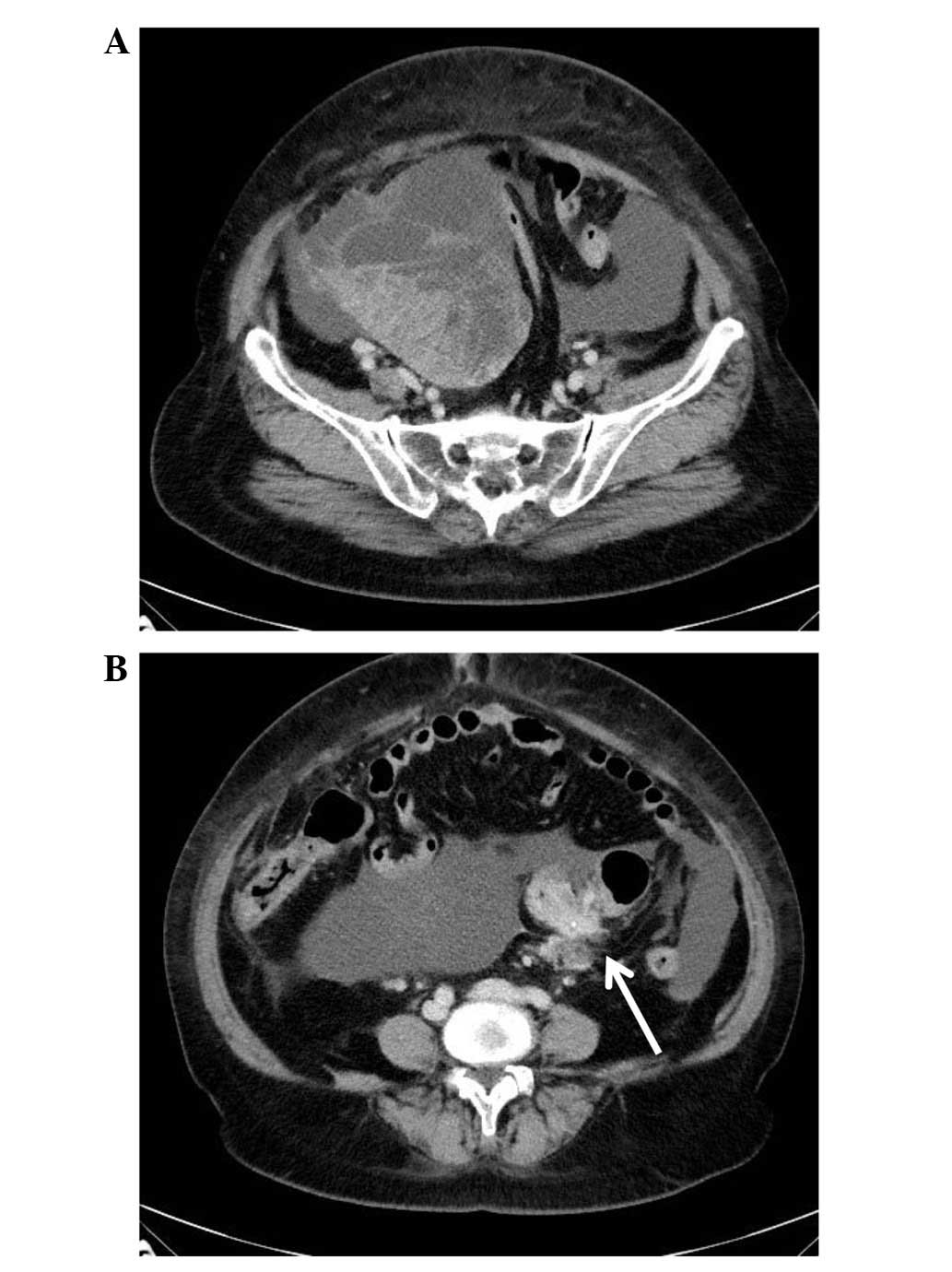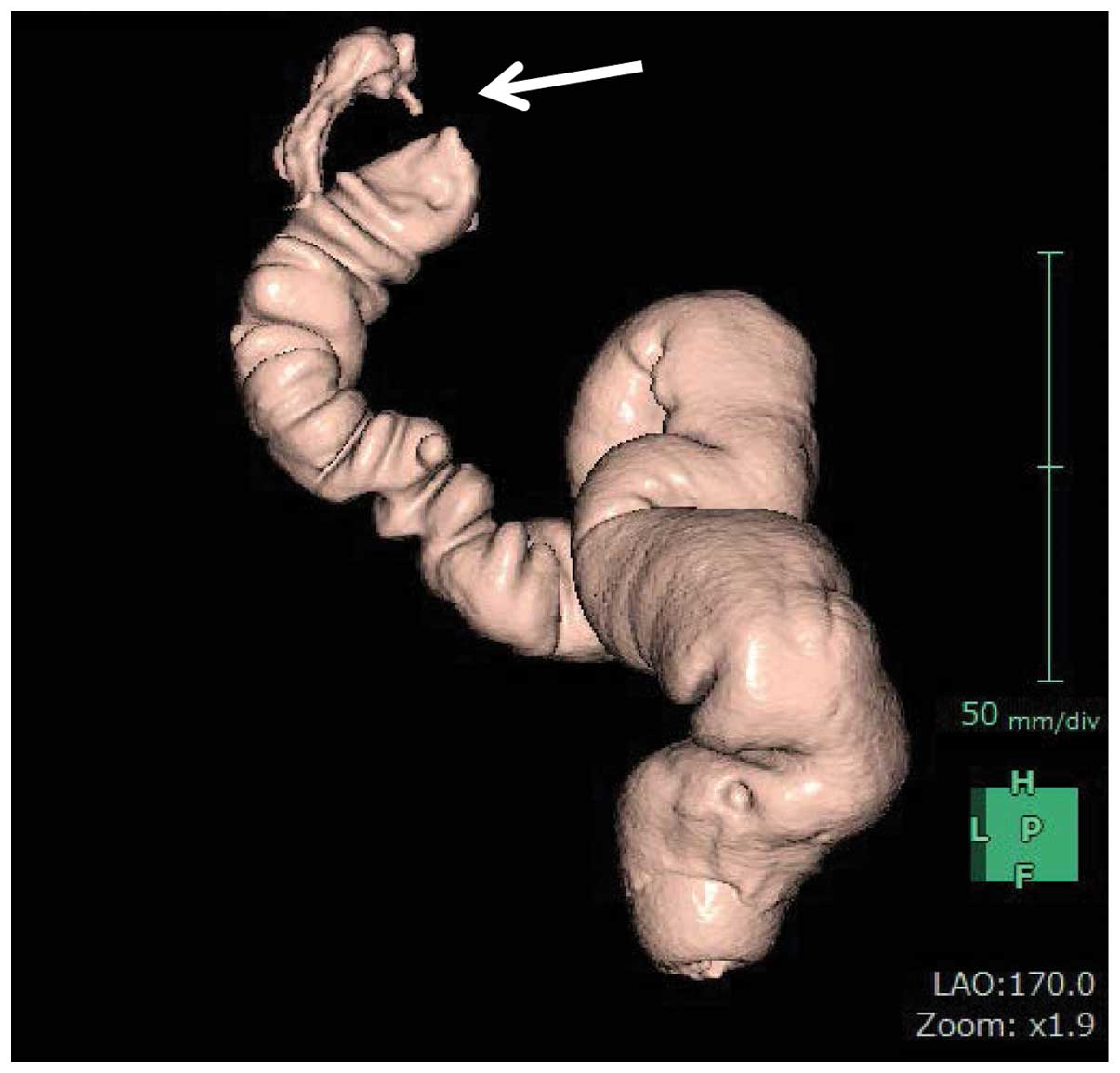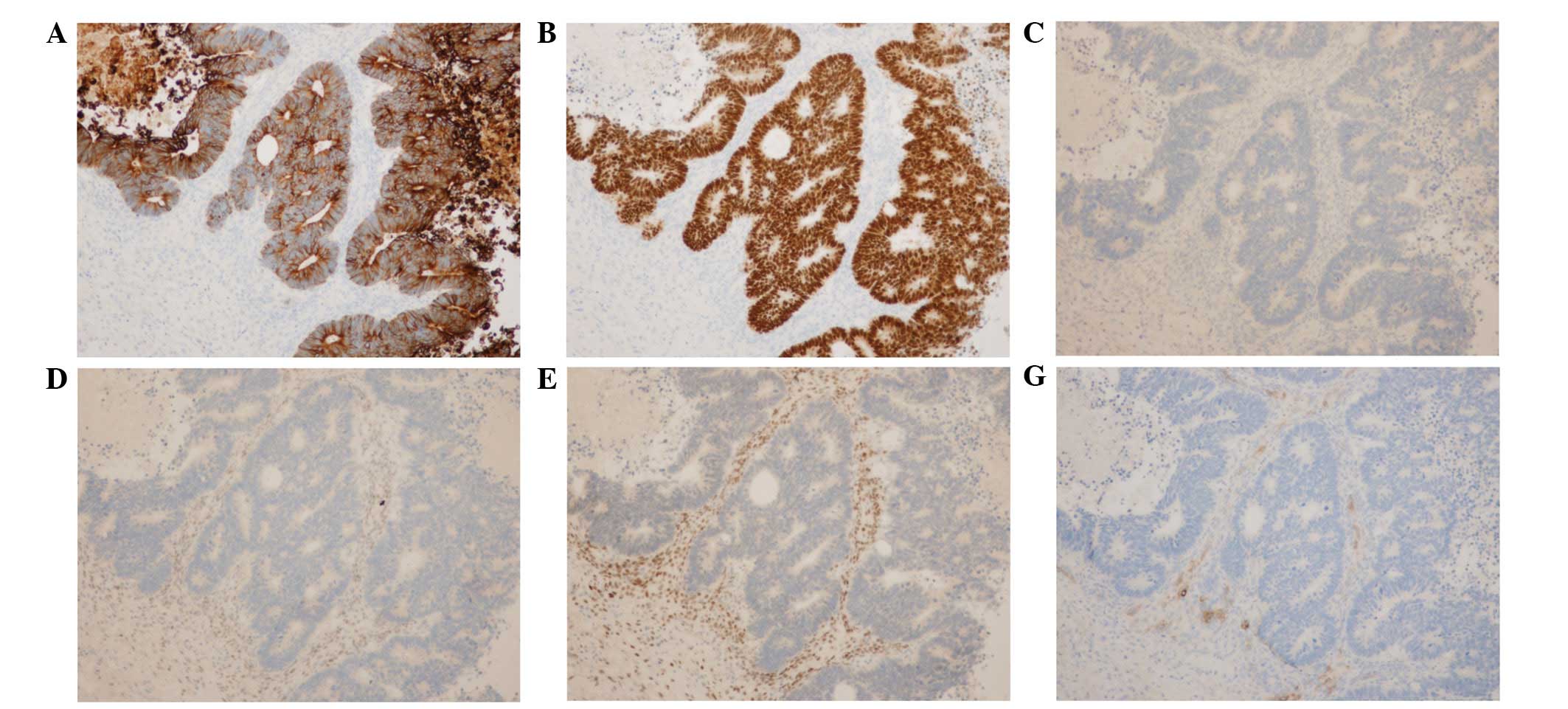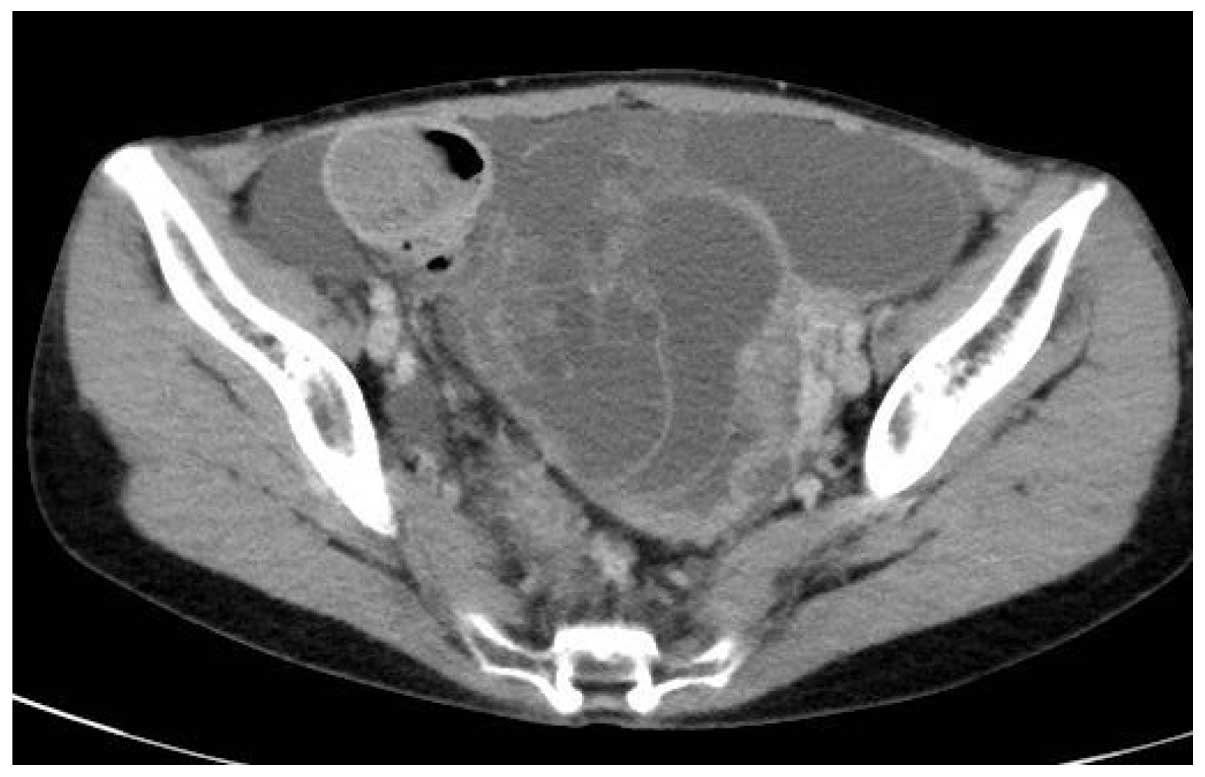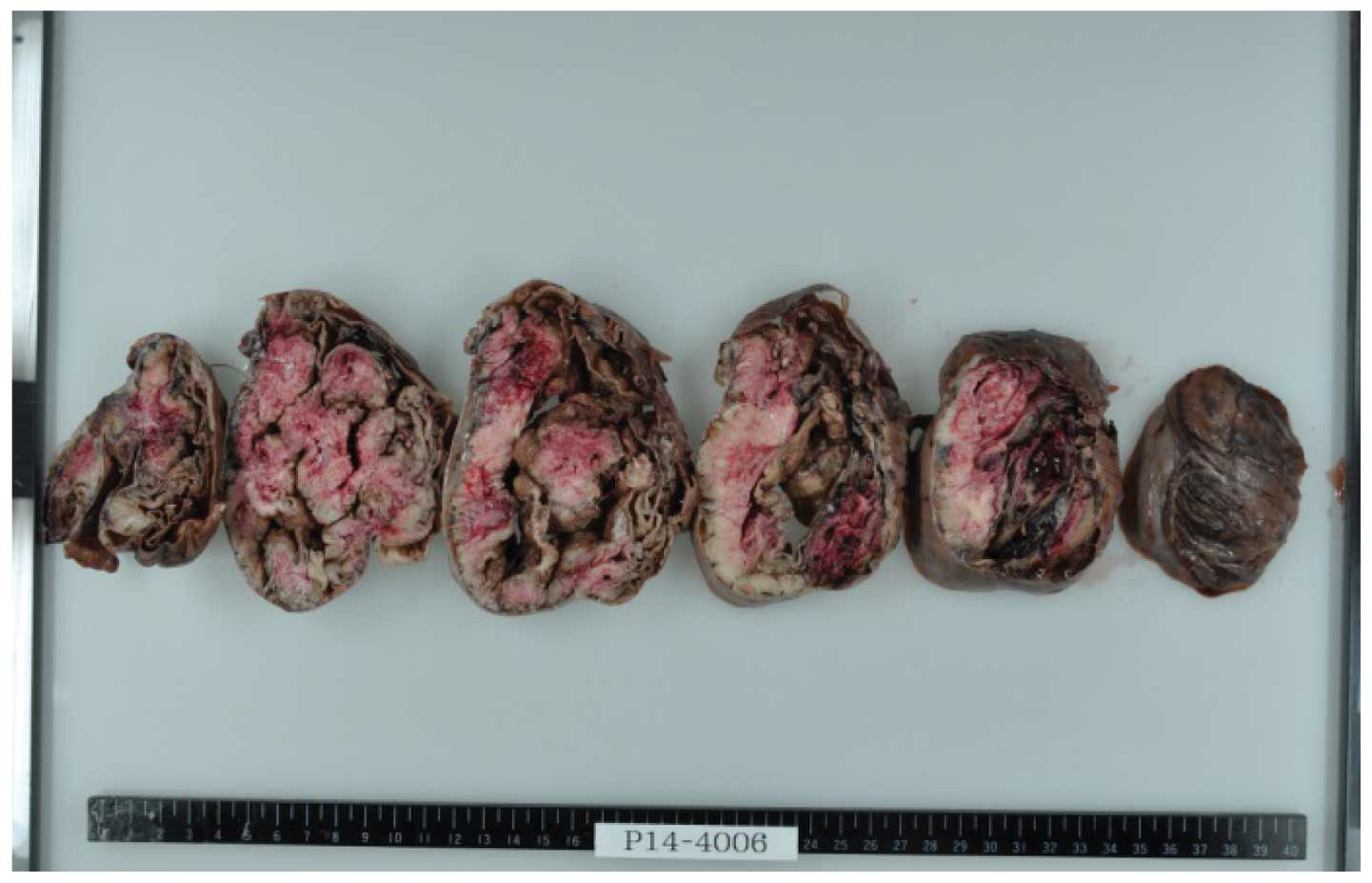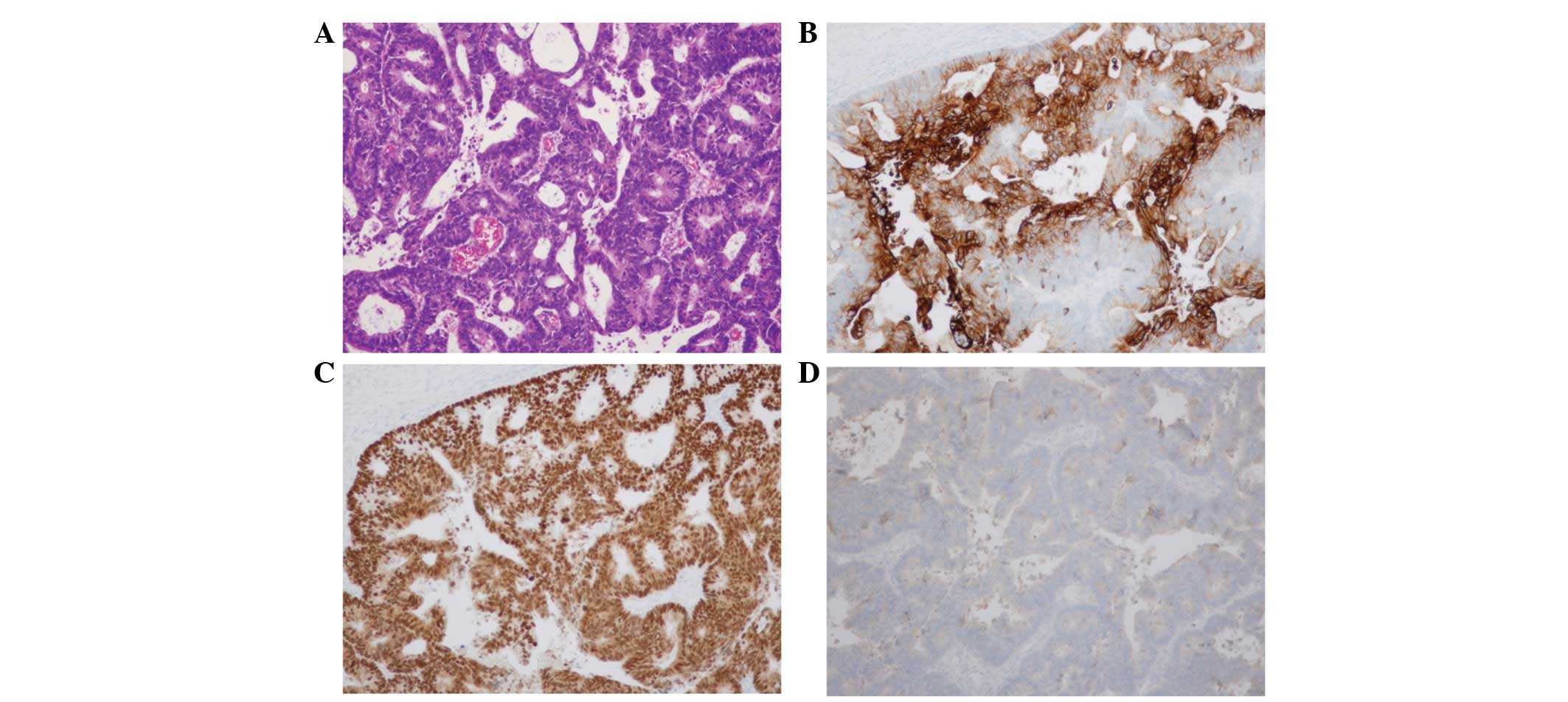|
1
|
Watanabe T, Itabashi M, Shimada Y, Tanaka
S, Ito Y, Ajioka Y, Hamaguchi T, Hyodo I, Igarashi M, Ishida H, et
al: Japanese Society for Cancer of the Colon and Rectum: Japanese
Society for Cancer of the Colon and Rectum (JSCCR) guidelines 2010
for the treatment of colorectal cancer. Int J Clin Oncol. 17:1–29.
2012. View Article : Google Scholar : PubMed/NCBI
|
|
2
|
Lee KR and Young RH: The distinction
between primary and metastatic mucinous carcinomas of the ovary:
Gross and histologic findings in 50 cases. Am J Surg Pathol.
27:281–292. 2003. View Article : Google Scholar : PubMed/NCBI
|
|
3
|
Shiono S, Saito T, Fujii H, Arakawa A,
Nakamura T and Yao T: A case of Krukenberg carcinoma metastasized
from colon cancer resembling mucinous cystadenocarcinoma of the
ovary. Int J Clin Exp Pathol. 7:394–401. 2013.PubMed/NCBI
|
|
4
|
Aiyer R, Sweetman K, Larsen-Disney P and
Fish A: A colorectal carcinoma imitating a primary ovarian
carcinoma in a postpartum woman. BMJ Case Rep. 2013:pii:
bcr2013201055. 2013.PubMed/NCBI
|
|
5
|
Hata T, Yoshioka S, Asukai K, Mizumoto S,
Nakanishi M, Hamano R, Maekawa T, Hama N, Kashiwazaki M, Taniguchi
M, et al: Two cases of ovarian metastasis of colon cancer. Gan To
Kagaku Ryoho. 38:2286–2288. 2011.(In Japanese). PubMed/NCBI
|
|
6
|
Chung TS, Chang HJ, Jung KH, Park SY, Lim
SB, Choi HS and Jeong SY: Role of surgery in the treatment of
ovarian metastases from colorectal cancer. J Surg Oncol.
100:570–574. 2009. View Article : Google Scholar : PubMed/NCBI
|
|
7
|
Rayson D, Bouttell E, Whiston F and Stitt
L: Outcome after ovarian/adnexal metastectomy in metastatic
colorectal carcinoma. J Surg Oncol. 75:186–192. 2000. View Article : Google Scholar : PubMed/NCBI
|
|
8
|
Ayhan A, Tuncer ZS and Bükülmez O:
Malignant tumors metastatic to the ovaries. J Surg Oncol.
60:268–276. 1995. View Article : Google Scholar : PubMed/NCBI
|
|
9
|
Graffner HO, Alm PO and Oscarson JE:
Prophylactic oophorectomy in colorectal carcinoma. Am J Surg.
146:233–235. 1983. View Article : Google Scholar : PubMed/NCBI
|
|
10
|
MacKeigan JM and Ferguson JA: Prophylactic
oophorectomy and colorectal cancer in premenopausal patients. Dis
Colon Rectum. 22:401–405. 1979. View Article : Google Scholar : PubMed/NCBI
|
|
11
|
Birnkrant A, Sampson J and Sugarbaker PH:
Ovarian metastasis from colorectal cancer. Dis Colon Rectum.
29:767–771. 1986. View Article : Google Scholar : PubMed/NCBI
|
|
12
|
Cho KC and Gold BM: Computed tomography of
Krukenberg tumors. AJR Am J Roentgenol. 145:285–288. 1985.
View Article : Google Scholar : PubMed/NCBI
|
|
13
|
Wauters CC, Smedts F, Gerrits LG, Bosman
FT and Ramaekers FC: Keratins 7 and 20 as diagnostic markers of
carcinomas metastatic to the ovary. Hum Pathol. 26:852–855. 1995.
View Article : Google Scholar : PubMed/NCBI
|
|
14
|
Berezowski K, Stastny JF and Kornstein MJ:
Cytokeratins 7 and 20 and carcinoembryonic antigen in ovarian and
colonic carcinoma. Mod Pathol. 9:426–429. 1996.PubMed/NCBI
|
|
15
|
German MS, Wang J, Fernald AA, Espinosa R
III, Le Beau MM and Bell GI: Localization of the genes encoding two
transcription factors, LMX1 and CDX3, regulating insulin gene
expression to human chromosomes 1 and 13. Genomics. 24:403–404.
1994. View Article : Google Scholar : PubMed/NCBI
|
|
16
|
Mutoh H, Sakurai S, Satoh K, Tamada K,
Kita H, Osawa H, Tomiyama T, Sato Y, Yamamoto H, Isoda N, et al:
Development of gastric carcinoma from intestinal metaplasia in
Cdx2-trasgenic mice. Cancer Res. 64:7740–7747. 2004. View Article : Google Scholar : PubMed/NCBI
|
|
17
|
Li MK and Folpe AL: CDX-2, a new marker
for adenocarcinoma of gastrointestinal origin. Adv Anat Pathol.
11:101–105. 2004. View Article : Google Scholar : PubMed/NCBI
|
|
18
|
Guo RJ, Suh ER and Lynch JP: The role of
Cdx proteins in intestinal development and cancer. Cancer Biol
Ther. 3:593–601. 2004. View Article : Google Scholar : PubMed/NCBI
|
|
19
|
Kato R, Murata K, Okamura S, Wada Y,
Makino S, Nishigaki T, Owada Y, Murakami M, Okada K, Ebisui C, et
al: Resection of ovarian metastasis of colon cancer to improve
quality of life. Gan To Kagaku Ryoho. 39:2278–2279. 2012.(In
Japanese). PubMed/NCBI
|
|
20
|
McCormick CC, Giuntoli RL II, Gardner GJ,
Schulick RD, Judson K, Ronnett BM, Vang R and Bristow RE: The role
of cytoreductive surgery for colon cancer metastatic to the ovary.
Gynecol Oncol. 105:791–795. 2007. View Article : Google Scholar : PubMed/NCBI
|
|
21
|
Jiang R, Tang J, Cheng X and Zang RY:
Surgical treatment for patients with different origins of
Krukenberg tumors: Outcomes and prognostic factors. Eur J Surg
Oncol. 35:92–97. 2009. View Article : Google Scholar : PubMed/NCBI
|
|
22
|
Saltz LB, Clarke S, Díaz-Rubio E,
Scheithauer W, Figer A, Wong R, Koski S, Lichinitser M, Yang TS,
Rivera F, et al: Bevacizumab in combination with oxaliplatin-based
chemotherapy as first-line therapy in metastatic colorectal cancer:
A randomized phase III study. J Clin Oncol. 26:2013–2019. 2008.
View Article : Google Scholar : PubMed/NCBI
|
|
23
|
Fuchs CS, Marshall J and Barrueco J:
Randomized, controlled trial of irinotecan plus infusional, bolus,
or oral fluoropyrimidines in first-line treatment of metastatic
colorectal cancer: Updated results from the BICC-C study. J Clin
Oncol. 26:689–690. 2008. View Article : Google Scholar : PubMed/NCBI
|
|
24
|
Douillard JY, Siena S, Cassidy J,
Tabernero J, Burkes R, Barugel M, Humblet Y, Bodoky G, Cunningham
D, Jassem J, et al: Randomized, phase III trial of panitumumab with
infusional fluorouracil, leucovorin and oxaliplatin (FOLFOX4)
versus FOLFOX4 alone as first-line treatment in patients with
previously untreated metastatic colorectal cancer: The PRIME study.
J Clin Oncol. 28:4697–4705. 2010. View Article : Google Scholar : PubMed/NCBI
|
|
25
|
Köhne CH, Hofheinz R, Mineur L, Letocha H,
Greil R, Thaler J, Fernebro E, Gamelin E, Decosta L and Karthaus M:
First-line panitumumab plus irinotecan/5-fluorouracil/leucovorin
treatment in patients with metastatic colorectal cancer. J Cancer
Res Clin Oncol. 138:65–72. 2012. View Article : Google Scholar : PubMed/NCBI
|















